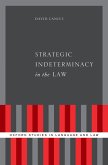BenutzerTop-Rezensenten Übersicht
Bewertungen
| Bewertung vom 31.03.2020 | ||

|
Strategic Indeterminacy in the Law (eBook, ePUB) Philosophers interested in vagueness have traditionally focused on how to solve the theoretical problems posed by the Sorites Paradox. Relatedly, past decades have seen the development of numerous intricate theories of the nature, logic and semantics of vague natural language – which have largely gone unnoticed outside of academic philosophy, though. More recently, a growing number of philosophers have turned towards the more tangible topic of vagueness in the law. And for good reason, it appears: not only is vagueness seemingly ubiquitous in legal texts, but the law also comprises plenty of interesting real-world examples of borderline or ‘hard’ cases and promises to be a rich source of principles and procedures that might inform our practical concerns when dealing with blurred boundaries. Moreover, the fact that vague legal terms and general clauses have survived decades of legal practice strongly suggests that vagueness might be beneficial to some purposes of the law – maybe linguistic vagueness is a valuable ingredient when it comes to ensuring legal flexibility and can consequently be used strategically. |
|
